Results
-
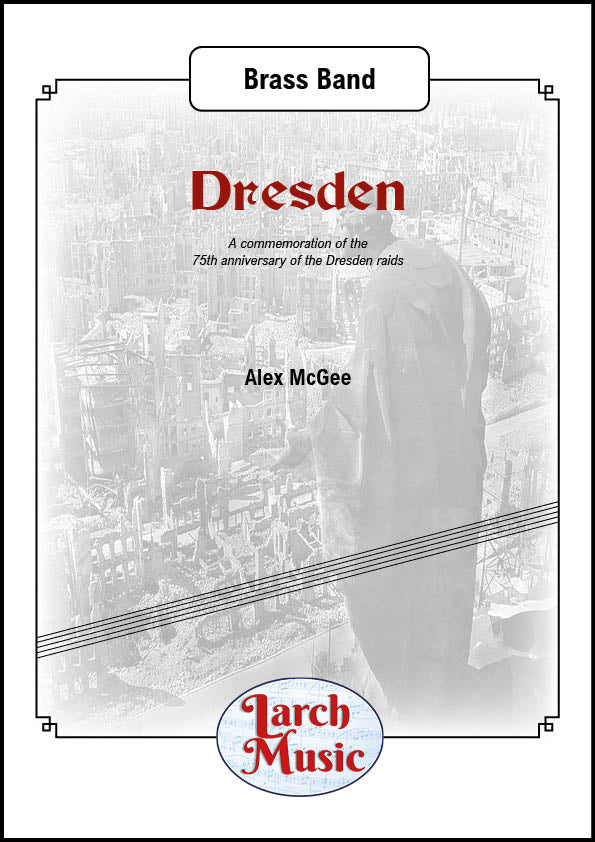 £25.00
£25.00Dresden - Brass Band - Full Score & Parts - LM955
COMPOSER: Alex McGeeThebombing of Dresdenwas aBritish-Americanaerial bombing attackon the city ofDresden, the capital of the Germanstate ofSaxony, duringWorld War II.In four raids between 13th and 15th February 1945, 722 heavy bombers of theBritishRoyal Air Force(RAF) and 527 of theUnited States Army Air Forces(USAAF)dropped more than 3,900 tons ofhigh-explosivebombsandincendiary deviceson the city.The bombing and the resultingfirestormdestroyed more than1,600 acres (6.5km2) of the city centre.An estimated 22,700to 25,000people were killed.Three more USAAF air raids followed, two occurring on 2nd Marchaimed at the city'srailway marshalling yardand one smaller raid on 17th April aimed at industrial areas.
In Stock: Estimated dispatch 3-5 working days
-
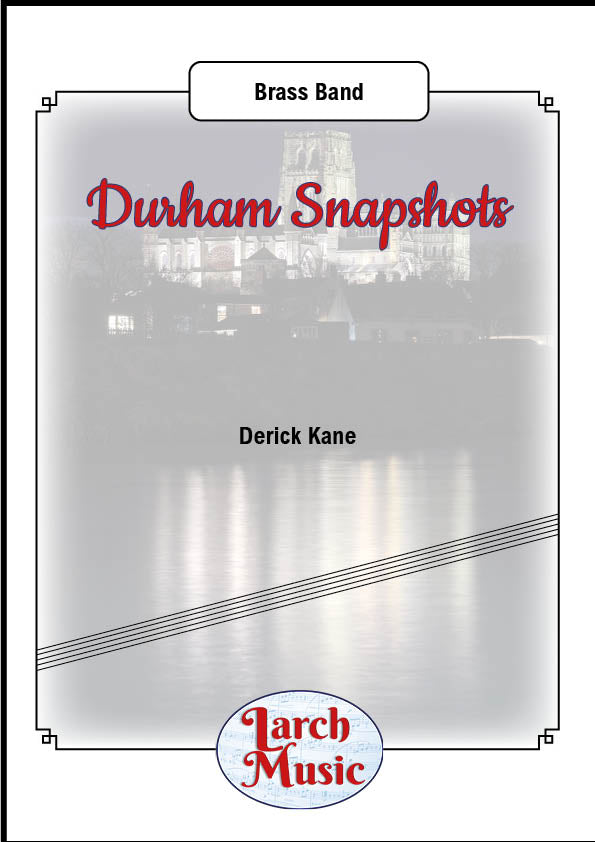 £65.00
£65.00Durham Snapshots - Brass Band - LM227
COMPOSER:Derick KaneDurham SnapshotsNew from the pen of renowned euphonium star, Derick Kane, an exciting composition written after a visit to the City of DurhamThis four movement work reflects the sights, sounds and history of the city of DurhamJ.B. Dykes hymn "St Cuthbert' is heard in movement 1 & reprised in the finale, as well as Ralph Vaughan Williams hymn 'Sine Nomine' in movement 31 - Cathedral2 - Riverside Walk 3 - Hymn to The Saints4 - CastleEnter the Cathedral and hear the glorious sounds of the open space and service.A Riverside Walk along the banks of the River Wear watching and listening to the wild life and running water.Hymn to The Saints with glorious harmonies soar through the air.And finally a trip to the castle where you can imagine battles and scourages taking place in this ancient building.One for your next concert to please the audience, and player, alike.
In Stock: Estimated dispatch 3-5 working days
-
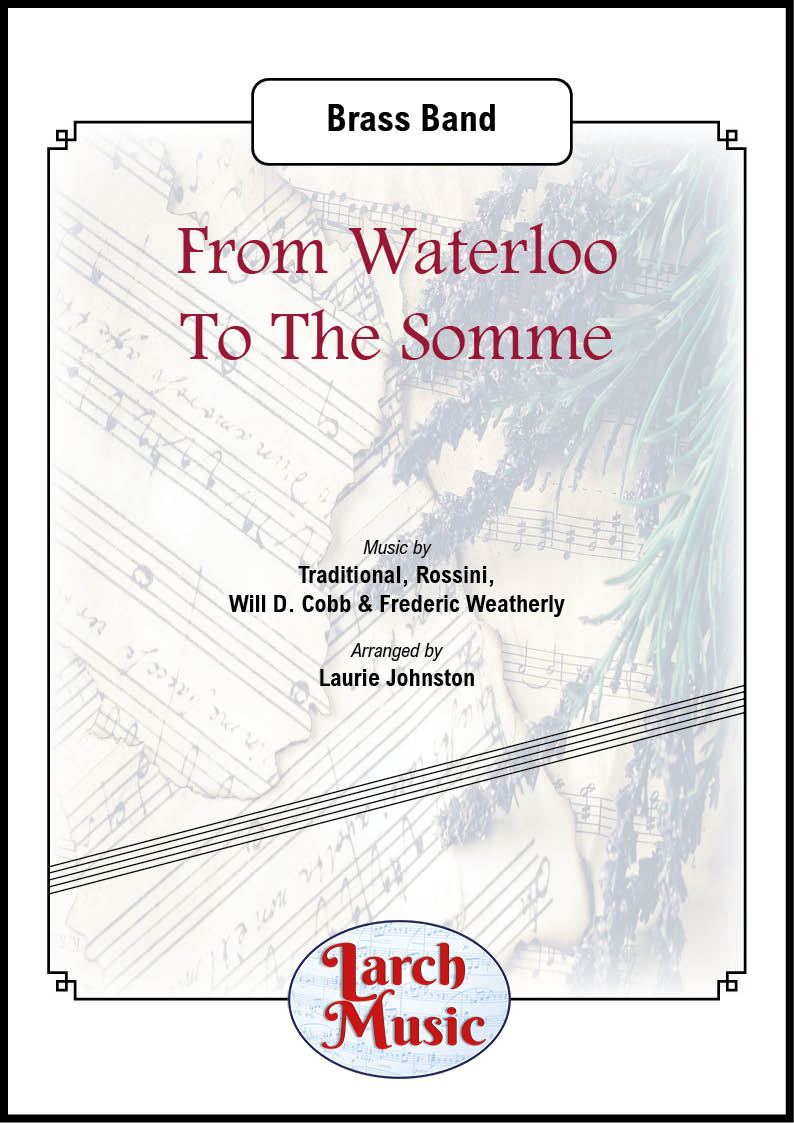 £25.00
£25.00From Waterloo To The Somme - Brass Band - LM774
COMPOSER: Traditional, Rossini, Will D. Cobb & Frederic WeatherlyARRANGER: Laurie JohnstonA great collection of war songs from The Battle of Waterloo to The SommeThe four main melodies in this piece are..1 Over the hills and Far Away.This song dates back as far as Queen Anne but was popular among soldiers during the Napoleonic Wars. Probably the most well known version these days is that by John Tams from the television series Sharpe.2 The Green Hills of Tyrol.This is one of the oldest tunes played by pipe bands today although originally written by Rossini for the William Tell ballet music. Pipe major John MacLeod of the 93rd Sutherland Highlanders heard it played by a Sardinian Military band during the Crimean War and transcribed it for pipes as a tribute to the number of VC's won by Scottish regiments in this conflict. It became very well known when Andy Stewart took the tune for his song The Scottish Soldier.3 Goodbye Dolly Gray.This is a music hall song by Will D. Cobb and was popularised as a Boer War anthem. It was written during the earlier Spanish - American and held it's popularity through to the first world war.4 Roses of Picardy.Written by Frederick Wetherly in 1916 it became a very big hit with the soldiers fighting in the trenches. Picardy is a region of northern France where the Somme battlefields are to be found which among other things possibly accounts for the songs great popularity. It sold on average 50.000 copies a month during the great war.
In Stock: Estimated dispatch 3-5 working days
-
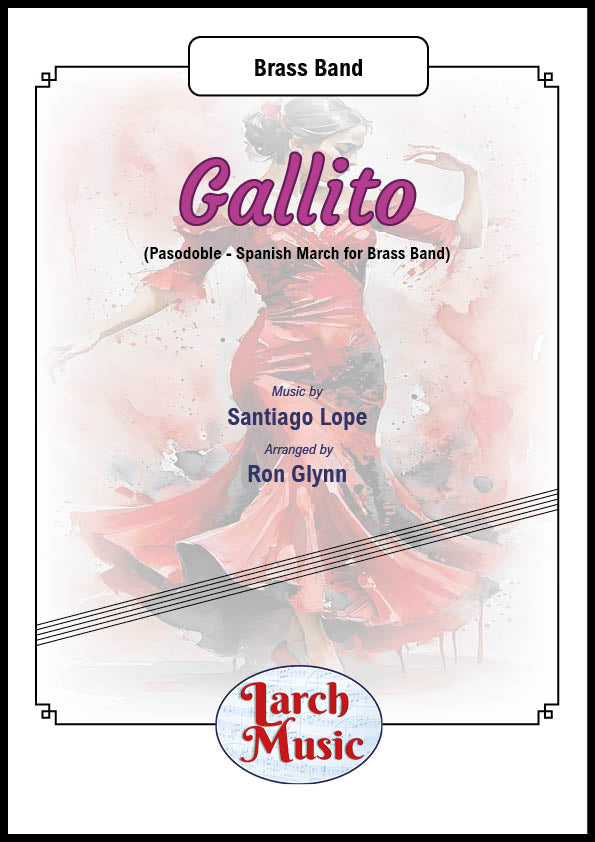 £30.00
£30.00Gallito (Santiago Lope arr. by Ron Glynn) - Brass Band Sheet Music Full Score & Parts - LM498
COMPOSER: Santiago LopeARRANGER: Ron GlynnBrass Band Sheet Music - Full Score and PartsProgramme NotesPasodoble for Brass BandThe newspapers of Valencia requested that Santiago Lope compose a pasodoble for a featured bullfight to be held at the local plaza de toros on June 29, 1905. Outdoing himself, he wrote not one, but four Pasodobles, one for each featured matador. These were: "Dauder" for Agustin Dauder, "Angelito" for Angel Gonzalez, "Vito" for Jose Manuel Perez and above all his masterpiece "Gallito" ("The little Cock") for Jose "Joselito" Gomez Ortega. As bullfighters often use nicknames in Spain, he used these popular names for most of the titles. Among the toreros featured in Valencia, "Joselito" Gomez Ortega was the most outstanding bullfighter, as he is "...comunmente aceptado como major torero de todos los tiempos" accepted as "most famous torero of all times" in Spain.LM498ISBN : 9790570004980
In Stock: Estimated dispatch 3-5 working days
-
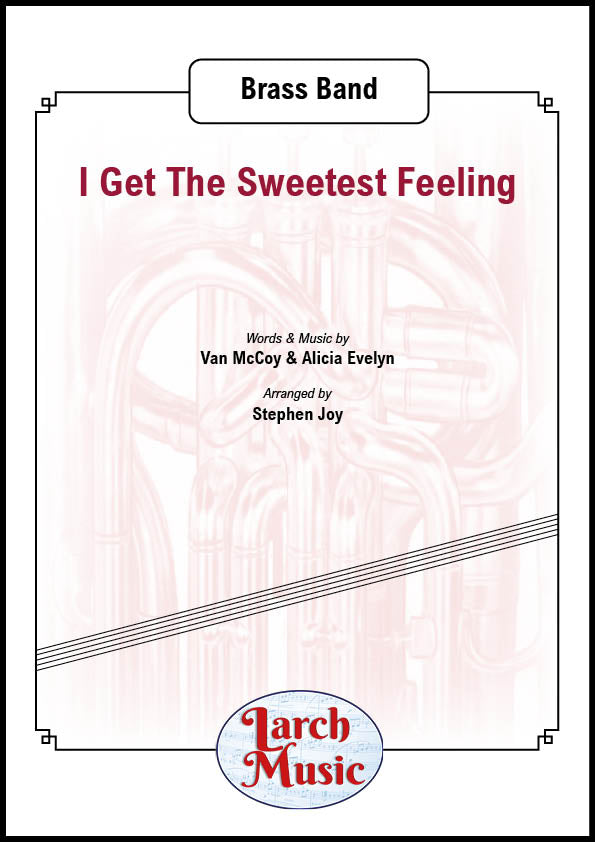 £21.50
£21.50I Get The Sweetest Feeling - Brass Band - LM733
COMPOSER: Van McCoy & Alicia EvelynARRANGER: Stephen JoyISMN - 0708210655941The track is a Motown inspired song recorded during his Chicago period when Jackie Wilson regained energy and started to record many singles and albums again.The track was written by Van McCoy and Alicia Evelyn.The orchestra was directed by Willie Henderson with Motown's in-house band Funk Brothers performing the instrumental track with The Andantes providing the background vocals.The single was originally a moderate chart success securing a No.34 position on the Billboard charts.Four years later, the single was released in the United Kingdom and managed to become a top 10 hit, reaching number nine.After the success of the re-release of "Reet Petite" in 1987, it was decided to posthumously re-release this track as well.The re-release hit the British top 10 again, peaking at number three in the UK Singles chart.
In Stock: Estimated dispatch 3-5 working days
-
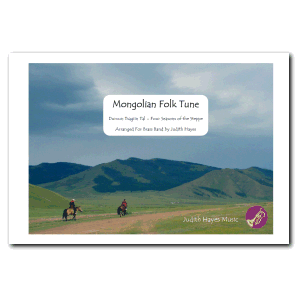 £30.00
£30.00Mongolian Folk Tune - Brass Band - Traditional - Judith Hayes
COMPOSER:TraditionalARRANGER: Judith HayesDurvun Tsagiin Tal - Four Seasons of the Steppe
In Stock: Estimated dispatch 3-5 working days
-
 £30.00
£30.00Murder On The Dancefloor (Sophie Ellis-Bextor & Gregg Alexander arr. by David Beal) - Brass Band Music Full Score & Parts - LMAM085
Any purchases from this site cannot be made please click on the link belowAny purchases from this site cannot be made please click on the link aboveCOMPOSER: Gregg Alexander & Sophie Ellis-BextorARRANGER: David Beal"Murder on the Dancefloor" is a song written by Sophie Ellis-Bextor and Gregg Alexander, produced by Alexander and Matt Rowe for Ellis-Bextor's debut studio album, Read My Lips (2001). Released on 3 December 2001, the song peaked at number two on the UK Singles Chart and became a top-10 hit worldwide, charting within the top three in Australia, New Zealand, and four European countries. In the United States, the single reached number nine on the Billboard Maxi-Singles Sales chart. "Murder on the Dancefloor" is reported to have been the most played song in Europe in 2002. In January 2024, following its use in the film Saltburn and its subsequent popularity on TikTok, "Murder on the Dancefloor" again reached number two on the UK Singles Chart, becoming Ellis-Bextor's first top-10 appearance since 2007. It entered the US Billboard Hot 100 the same month, making it Ellis-Bextor's first appearance on that chart. It also peaked at number 10 on the Billboard Global 200, her first top-ten and overall first entry on the chart.Scored For :Any purchases from this site cannot be made please click on the link above
In Stock: Estimated dispatch 3-5 working days
-
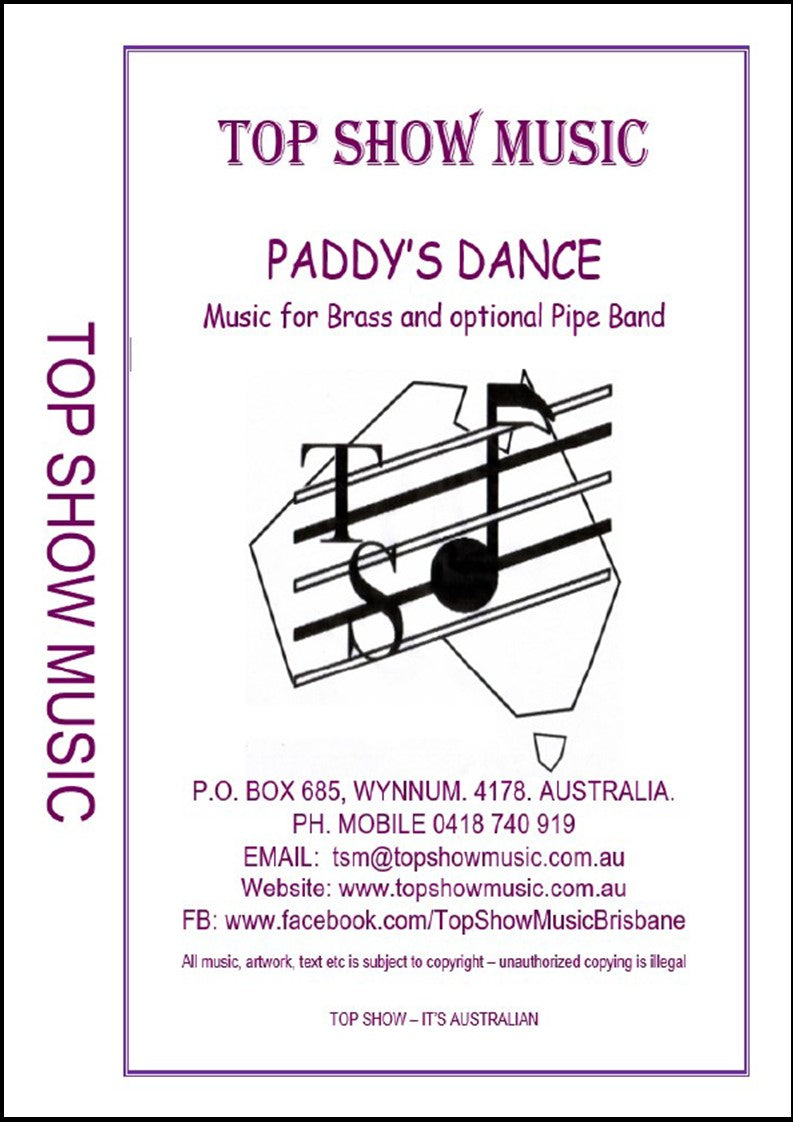 £30.00
£30.00Paddy's Dance - Brass Band - Strauss
COMPOSER: StraussARRANGER: David BealBased on the old Celtic Jig. Paddy's Dance open with percussion and a Xylophone feature.The original Jig has four themes but this version has two more themes added.An optional piper our full pipe band may be added if you desire (Pipe Band parts are included).
In Stock: Estimated dispatch 3-5 working days
-
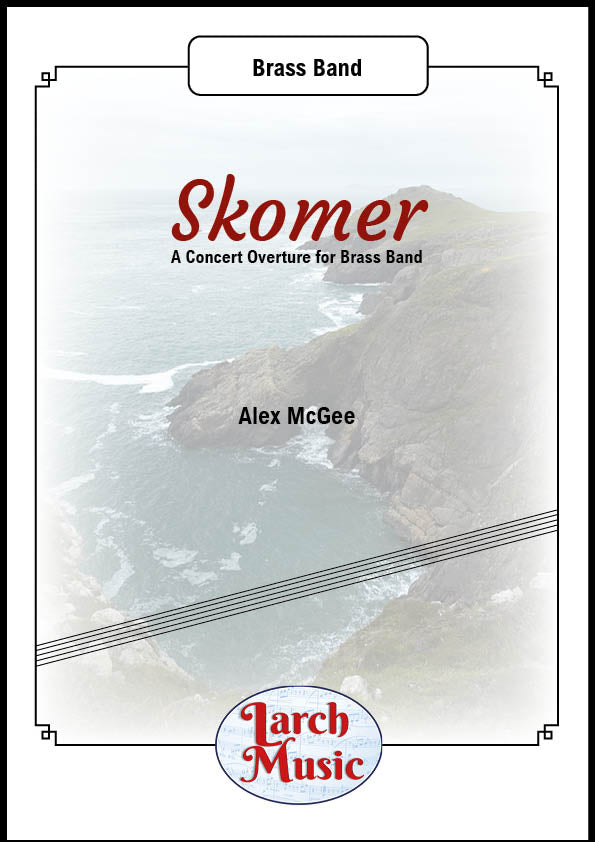 £25.00
£25.00Skomer - Brass Band Full Score & Parts - LM294
COMPOSER: Alex McGeeSkomer Island, situated off the Pembrokeshire coast is a haven for a wide variety of marine life, notably sea birds.Puffins, gannets and shearwaters congregate in vast numbers over the cliffs while on land the Skomer Vole is unique to the island.At sea, porpoise, grey seals and dolphins abound, often putting on spectacular displays for visitors lucky enough to see them at play.This work tries to encapsulate some of the ebullience that the wildlife displays. As the work begins picture yourself as a bird, perhaps one of the kestrels that nest there hovering over the teeming mass of sea birds below, seeing puffins bobbing along, gannets diving for fish and gulls soaring on the breeze.Next, with a change of time signature, we dive below the surface, swimming along side playful seals and dolphins before leaping from the water full of the joys of life.However, the music takes us to a more brutal reality, the plight of such island idylls across the world. The music encourages you to reflect on the fragility of nature, and on the damage we are doing to these precious environments.Following this reflection, we are once again uplifted, with the composer taking inspiration from natures ability to overcome all we have thrown in her way and survive.Note to the conductor re percussionThe glockenspiel part is optional and can be played in place of the vibraphone where one is unavailable.The timpanist will require four drums for the performance and adequate time is given for changes throughout.Suitable for Most Bands - Duration 4'.00" (Approx.)
In Stock: Estimated dispatch 3-5 working days
-
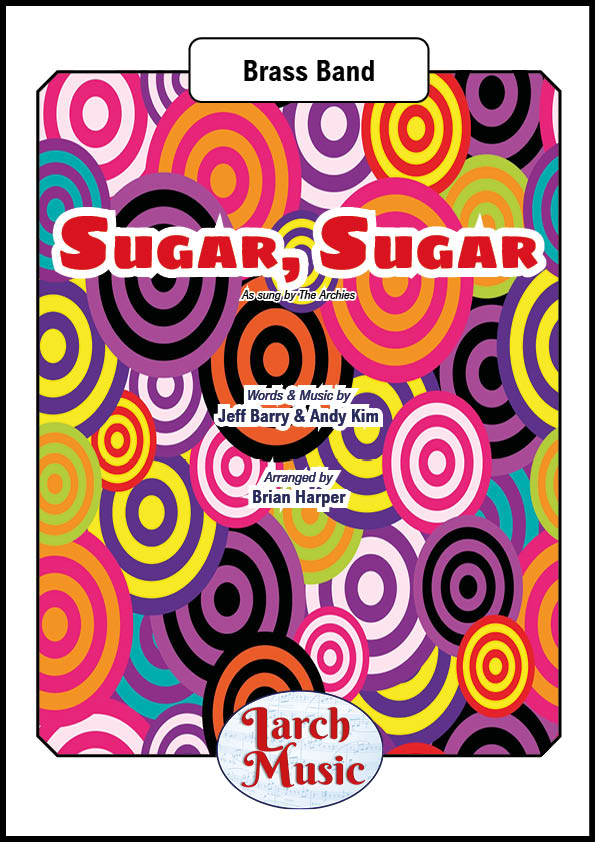 £25.00
£25.00Sugar Sugar - Brass Band Sheet Music Full Score & Parts - LM854 - Jeff Barry & Andy Kim
COMPOSER: Jeff Barry & Andy KimARRANGER Brian HarperIt was originally recorded by thecartoon bandthe Archies.This version peaked at No. 1 in the US on theBillboardHot 100chart in 1969 and remained there for four weeks.It also peaked at No. 1 on theUK Singles chartin that same year for eight weeks.The song became a hit again in 1970 whenrhythm and bluesandsoulsingerWilson Picketttook it back onto the chartswith his own version.And now available for Brass Band...LM854 - ISMN : 9790570008544
In Stock: Estimated dispatch 3-5 working days










